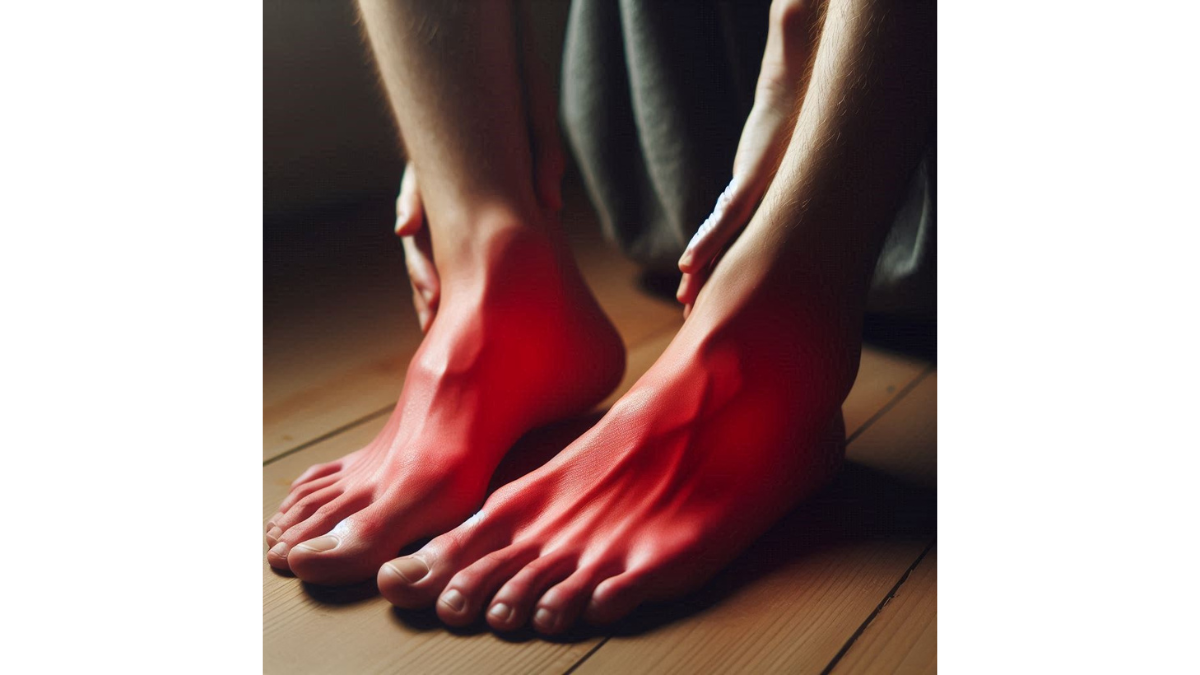Exploring the Factors Behind Hot Feet

Exploring the Factors Behind Hot Feet – When it comes to foot health, we often underestimate how much our feet can tell us about our overall well-being. One condition that many individuals might experience is known as “hot feet.” For those who have been amid the discomfort it can bring, understanding what hot feet are, the symptoms, and their potential causes is crucial.
Definition of Hot Feet
Hot feet, medically referred to as burning feet syndrome, is characterized by an uncomfortable sensation of warmth, burning, or tingling in the feet. This uncomfortable feeling can emerge for various reasons, often signaling that something deeper is going on within your body. Imagine coming in after a long day on your feet, peeling off your shoes, and the moment you do, it feels like your feet are on fire. It’s not just a simple issue – this sensation might stem from nerves, circulation problems, or even underlying metabolic conditions. Hot feet can affect anyone, regardless of age or health status, although it’s more commonly reported among individuals with specific risk factors. In the following sections, we’ll delve deeper into the common symptoms and the various causes associated with this perplexing condition.
Common Symptoms to Watch Out For
Recognizing the symptoms of hot feet can be your first step toward effective management. While the sensation of warmth or burning is the hallmark symptom, you might also experience other warning signs that could indicate that you need to take a closer look at your foot health. Here are some key symptoms to watch out for:
- Burning Sensation: The most obvious symptom, usually felt more intensely in the evening or after extended periods of standing or walking.
- Tingling or Numbness: You may notice your feet feeling prickly, similar to the sensation experienced when your foot “falls asleep.”
- Swelling: Sometimes hot feet can also come along with swelling, making it uncomfortable to wear shoes.
- Increased Sensitivity: Your feet may become hypersensitive to touch, where even light contact or pressure feels exaggerated.
- Redness or Discoloration: This can be indicative of vascular issues or inflammation, which may require prompt medical attention.
- Changes in Temperature: One foot may feel significantly warmer than the other, raising concerns about circulation or nerve damage.
If you’re experiencing one or more of these symptoms regularly, it’s wise not to dismiss them as mere discomfort. Instead, pay attention and consider keeping a journal of when these symptoms occur and how long they last. This information can be invaluable when discussing the problem with your healthcare provider. A personal anecdote worth sharing is one from a friend who, after years of ignoring her burning feet at night, finally sought medical attention. To her surprise, she discovered that her hot feet were a symptom of undiagnosed diabetes.
This wake-up call not only changed how she cared for her feet, but it also led her to make significant lifestyle changes that ultimately improved her overall health. Engaging with your body’s signals is not only a proactive measure; it can be the key to thwarting more serious health issues. In the next section, we will explore the myriad causes of hot feet, along with how lifestyle factors might play a role in this often-misunderstood condition. Understanding these aspects can empower you to better manage and even prevent the symptoms of hot feet from affecting your daily life. Whether it’s adjusting your footwear, reevaluating your diet, or seeking medical advice, taking informed action is essential in your journey toward comfortable and healthy feet.
Causes of Hot Feet
Having explored the symptoms associated with hot feet, it’s essential to delve into the underlying causes of this uncomfortable condition. Understanding why your feet feel hot not only brings clarity but also enables you to take steps toward alleviating the discomfort. Let’s examine the primary causes, which can be grouped into medical conditions and lifestyle factors.
Medical Conditions
Many medical conditions can lead to the sensation of hot feet. Identifying these underlying issues is crucial because they often require targeted treatment. Here are some of the most common medical contributors:
- Diabetes: One of the most significant causes of burning feet is diabetes-related peripheral neuropathy. This condition damages the nerves in your feet due to prolonged high blood sugar levels. As a result, many people with diabetes feel a burning sensation or numbness in their feet. If you frequently experience hot feet and have a history of diabetes in your family, it’s vital to consult a health professional.
- Peripheral Artery Disease (PAD): This condition restricts blood flow to the limbs due to narrowed arteries. Reduced circulation can lead to a range of symptoms, including hot feet, as the body’s ability to regulate temperature diminishes. “When I was diagnosed with PAD, it was eye-opening how something so seemingly minor could lead to significant discomfort,” shares a friend who has learned to manage her symptoms through regular exercise and dietary adjustments.
- Hypothyroidism: This hormonal disorder can lead to disrupted thermal regulation in the body. People with an underactive thyroid may experience a range of symptoms, including the sensation of warmth or heat in their extremities, affecting their foot health.
- Multiple Sclerosis (MS): For individuals with MS, nerve signal disruptions can lead to unusual sensations, including feelings of warmth. This can present as hot feet or other areas of the body.
- Infections: Fungal infections, particularly athlete’s foot, can cause inflammation and lead to the sensation of burning or heat in your feet. Keeping your feet clean and dry is key to preventing these types of infections.
Understanding these medical conditions highlights the importance of not ignoring persistent hot feet. If you suspect an underlying health issue, consider reaching out to a healthcare professional for a comprehensive evaluation.
Lifestyle Factors
While medical conditions can create the perfect storm for hot feet, lifestyle choices also play a significant role in the comfort and health of your feet. Being mindful of your daily habits can go a long way in preventing or alleviating this condition. Here are some common lifestyle factors contributing to hot feet:
- Improper Footwear: One of the most straightforward causes of hot feet is wearing shoes that don’t fit well. Tight shoes can restrict blood flow, while non-breathable materials can trap heat. “After switching to breathable sandals at work instead of closed-toe shoes, I noticed a dramatic decrease in discomfort,” shares another friend who used to endure daily foot burning.
- Excessive Standing or Walking: Long durations spent on your feet can lead to fatigue and overheating, particularly in hot weather. If your job requires extensive standing or walking, consider taking breaks or alternating your footwear to enhance comfort.
- Physical Activity: While staying active is necessary for maintaining overall health, overexertion can lead to heated feet. Giving your body adequate time to recuperate after heavy workouts is crucial for preventing these sensations.
- Diet: Some foods can induce inflammation or heat production in the body. Spicy foods, for instance, may make you feel warmer. Additionally, a diet high in sugar can potentially contribute to nerve damage over time, further exacerbating hot feet.
- Hydration: Dehydration can impair circulation and lead to increased body temperature. Ensure you’re sipping enough water throughout the day to keep your body functioning optimally.
Adopting a few changes can have a fantastic impact on how comfortable your feet feel. Maintaining a balanced diet, investing in proper footwear, and giving your feet adequate rest could lead to a noticeable difference. In the next section, we will examine risk factors associated with hot feet and how your age, gender, and other health conditions might increase your susceptibility. Armed with this information, you’re one step closer to identifying the root cause of your hot feet and finding effective ways to manage them.
Risk Factors Associated with Hot Feet
Understanding the causes of hot feet opens the door to recognizing who might be more susceptible to this condition. Multiple risk factors can contribute to the likelihood of developing burning feet, and knowing these can help you take proactive steps toward management and prevention. In this section, we’ll dive deeper into how age, gender, and underlying health conditions can impact your experience with hot feet.
Age and Gender
Age is a significant risk factor when it comes to numerous health conditions, including those that contribute to burning feet. Here’s how age and gender can influence the prevalence of hot feet:
- Age: As you get older, your body goes through various changes, including alterations in blood circulation and nerve sensitivity. Older adults may experience diminished blood flow or nerve function, leading to heightened sensations of heat or discomfort in the feet. A study indicated that those over 60 are more likely to report symptoms of burning feet, often linked to age-related conditions such as diabetes or neuropathy.
- Gender: Research indicates that gender can influence the risk of experiencing hot feet. For instance, men tend to be more affected by peripheral artery disease, one of the medical conditions associated with hot feet, which can lead to sensations of warmth or burning. On the other hand, women are often more prone to conditions like rheumatoid arthritis, which can also lead to similar symptoms.
Personal experiences can illuminate this aspect. Take my neighbor, who is in her early sixties; she used to enjoy long walks in the park. However, she began noticing her feet feeling hot and uncomfortable after only a short time outdoors. After visiting her doctor, she learned that her age and reduced blood circulation played a critical role in her symptoms. Recognizing the impact of age and gender on foot health will help you make more informed choices about self-care.
Other Health Conditions
In addition to age and gender, several health conditions can significantly increase the risk of developing hot feet. Here’s a closer look at some of these:
- Diabetes: As previously mentioned, diabetes is a well-known contributor to hot feet. Diabetic neuropathy, resulting from long-term high blood sugar, can damage the nerves in your feet. Regular monitoring of blood sugar levels and maintaining a balanced diet can help manage this risk factor effectively.
- Chronic Kidney Disease: This condition may lead to fluid and electrolyte imbalances, affecting nerve function and leading to sensations of heat in the feet. Staying on top of your kidney health can be crucial for preventing complications.
- Hypothyroidism: Those with an underactive thyroid may experience reduced blood flow and temperature regulation issues, both of which can contribute to hot feet. Regular check-ups and appropriate treatments can help keep this condition in check.
- Alcoholism: Excessive alcohol consumption can lead to nerve damage (alcoholic neuropathy), resulting in a burning sensation or unusual warmth in the feet. Cutting back on alcohol can not only help alleviate symptoms but also benefit overall health.
- HIV/AIDS: This condition can highlight peripheral neuropathy in some patients, leading to discomfort, including hot feet. It underscores the importance of ongoing management in individuals living with these chronic conditions.
- Vitamin Deficiencies: In particular, deficiencies in B vitamins (B1, B6, and B12) can lead to neuropathy and the resultant symptoms of hot feet. Ensuring a balanced diet rich in essential nutrients can be an effective preventive measure.
Being aware of these health conditions enhances the importance of maintaining regular health screenings and discussions with your healthcare provider. For example, my cousin was aware of his diabetic condition but did not realize the implications it had on his foot health until he faced persistent discomfort. This led him to be proactive about managing his blood sugar levels and discussing foot care with his doctor. Understanding the risk factors associated with hot feet is crucial for both prevention and management. In the next section, we’ll focus on the diagnostic tests available for hot feet and the various treatment approaches that can help mitigate this uncomfortable condition. With knowledge comes the power to take control of your health—let’s empower you to take the necessary steps toward comfortable feet!
Diagnosis and Treatment Options for Hot Feet
Having explored the risk factors associated with hot feet, it’s essential to understand how to diagnose this condition and the treatment options available. This process can significantly alleviate discomfort and prevent future episodes, giving you a clearer path toward managing your foot health effectively. Let’s dive into the diagnostic tests typically recommended and the various treatment approaches you might consider.
Diagnostic Tests
If you’re experiencing persistent hot feet, the first step is to consult a healthcare provider. They will likely begin with a comprehensive assessment, including a detailed history of your symptoms, lifestyle, and any underlying health conditions. Here are some common diagnostic tests that might be recommended:
- Physical Examination: Your doctor will perform a physical examination to assess blood flow in your extremities and check for any signs of nerve damage or skin conditions.
- Blood Tests: These can help determine if you have diabetes, thyroid issues, vitamin deficiencies, or other metabolic conditions that may be contributing to your symptoms. For example, a blood glucose test can help detect any problems with blood sugar regulation.
- Nerve Conduction Studies: These tests measure how well electrical signals travel through your nerves. If the results indicate decreased function, this may suggest neuropathy, which could be the source of your hot feet.
- Ultrasound or Doppler Studies: These imaging tests can evaluate blood flow in your legs and feet to check for any circulatory issues, such as peripheral artery disease.
- Skin Biopsy: In some cases, a small skin sample may be taken to examine nerve fibers for any signs of damage or disease.
Seeking answers through proper diagnostic tests is essential; it provides both you and your healthcare provider with crucial tools to determine the next steps for treatment. In a personal experience, my friend was persistent in seeking medical attention when she faced increasingly uncomfortable symptoms. After a series of tests, doctors discovered early-stage diabetic neuropathy. This early diagnosis allowed her to adopt preventive measures, which have greatly reduced her symptoms.
Treatment Approaches
Once a diagnosis is confirmed, your healthcare provider will discuss treatment options tailored to your specific needs. Treatment for hot feet generally focuses on addressing the underlying cause and alleviating symptoms. Here are some common approaches:
- Medication: Depending on the underlying condition, medication may play a critical role.
- For neuropathic pain, medications such as gabapentin or pregabalin can help reduce sensations.
- If diabetes is the culprit, maintaining proper blood sugar levels through medication is essential.
- Lifestyle Modifications: Changes in your daily routine can significantly help manage symptoms. Here’s how:
- Footwear: Invest in well-fitting, breathable shoes. Avoid tight shoes that can restrict circulation.
- Dietary Changes: If you have certain health conditions, consider speaking with a nutritionist to help guide you in making better food choices. Adding foods rich in B vitamins can provide support to nerve health.
- Therapy: Physical therapy may be prescribed to help improve circulation and strengthen foot muscles, reducing discomfort. Engaging in regular, moderate exercise can enhance blood flow and alleviate symptoms.
- Alternative Treatments: Some people find relief through complementary therapies, such as acupuncture, reflexology, or massage. These approaches can enhance relaxation and improve circulation, contributing to reduced symptoms.
- Skin Care: For those experiencing hot feet due to fungal infections or skin-related issues, maintaining proper foot hygiene is critical. Regular bathing, moisturizing, and wearing breathable socks can help prevent infections.
- Hydration: Don’t underestimate the power of hydration! Drinking enough water can improve circulation and keep your body functioning efficiently.
- Cooling Techniques: At home, applying cold compresses to your feet or soaking them in cool water can provide quick relief from hot sensations.
Remember, treatment should be tailored to your unique situation. Establishing an open line of communication with your healthcare provider will allow you to explore various strategies and find what works best for you. In closing, understanding the diagnostic process and available treatment options can significantly bolster your journey toward comfortable feet. By actively engaging in preventive measures and making informed decisions about your health, you’re well on your way to reclaiming comfort in your daily life. In the next segment, we’ll focus on effective prevention tips to help minimize the risk of developing hot feet in the first place. Let’s empower you to take control of your foot health!
Prevention Tips for Hot Feet
Now that we’ve discussed the importance of diagnosis and treatment options for hot feet, let’s shift our focus toward prevention. After all, an ounce of prevention is worth a pound of cure. Taking proactive measures can help you effectively minimize the risk of experiencing hot feet altogether.
Proper Foot Care
Taking good care of your feet is paramount in preventing discomfort, including the irritating sensation of hot feet. It’s essential to develop a regular foot care routine that addresses cleanliness, moisture, and protection. Here are some actionable tips you can implement:
- Daily Cleaning: Wash your feet every day with mild soap and water to remove sweat and dirt buildup. Be sure to dry them thoroughly, especially between the toes, where moisture can lead to fungal infections.
- Moisturizing: Keep your feet hydrated with a good foot cream or lotion to prevent dry, cracked skin. Apply moisturizer after washing and drying your feet, but avoid putting lotion between your toes to minimize moisture there.
- Nail Care: Regularly trim your toenails straight across to prevent ingrown nails, which can lead to pain and discomfort. If you’re unsure, consider consulting a podiatrist for a professional nail care routine.
- Choose the Right Footwear: Your shoes can make or break your foot health. Opt for breathable materials that allow air circulation and cushioned soles for added comfort. Make sure they fit well; there should be enough room for your toes to wiggle without feeling cramped.
- Breathable Socks: Invest in moisture-wicking socks made from materials that help keep your feet dry. Avoid cotton, as it can retain moisture and increase the risk of fungal infections.
- Regular Foot Inspections: Make it a habit to check your feet regularly for any signs of redness, swelling, or cracks. If you notice any persistent issues, don’t hesitate to consult a healthcare provider promptly.
A personal story here may resonate with you. My aunt, who had suffered from hot feet for years, began practicing proper foot care after consulting a podiatrist. It just goes to show how simple changes can yield remarkable results!
Healthy Lifestyle Choices
In addition to foot care, making healthy lifestyle choices can create an uplifting impact on your overall health and, consequently, your foot comfort. Here are some lifestyle modifications you can implement to help prevent hot feet:
- Stay Hydrated: Drinking enough water daily supports circulation and overall body function. Aim for at least eight glasses of water (or about two liters) a day, adjusting this amount based on your level of physical activity and climate.
- Balanced Diet: Eating a varied diet rich in fruits, vegetables, whole grains, lean proteins, and healthy fats can help supply your body with essential nutrients. Pay special attention to B vitamins, which support nerve health. Foods such as leafy greens, legumes, lean meat, and dairy can be beneficial.
- Regular Exercise: Engaging in regular physical activity promotes good circulation and overall cardiovascular health.
- Limit Alcohol and Quit Smoking: Both alcohol and tobacco can impair circulation and negatively affect peripheral nerve health. Cutting back can help improve blood flow and reduce your risk of developing symptoms.
- Manage Stress: Stress may exacerbate various symptoms, including those related to nerve discomfort. Consider integrating stress management techniques like yoga, meditation, or deep-breathing exercises into your daily routine.
- Footwear During Exercise: If you lead an active lifestyle, focusing on appropriate footwear for your chosen activities is vital. Invest in quality athletic shoes that provide proper support and cushioning, while allowing for breathability.
By adopting these healthy lifestyle choices, you’re fostering a holistic approach to wellness that transcends just foot health. Ultimately, the journey toward better foot comfort begins with awareness and practice. Implementing proper foot care routines coupled with healthy lifestyle choices can empower you to manage and prevent hot feet effectively. As we wrap up this exploration of hot feet, remember that awareness and proactive measures make all the difference. If you do face ongoing discomfort, don’t hesitate to seek professional guidance to ensure your feet remain happy and healthy!
You might also find this article helpful Weight Management: Tips for a Healthy Weight





